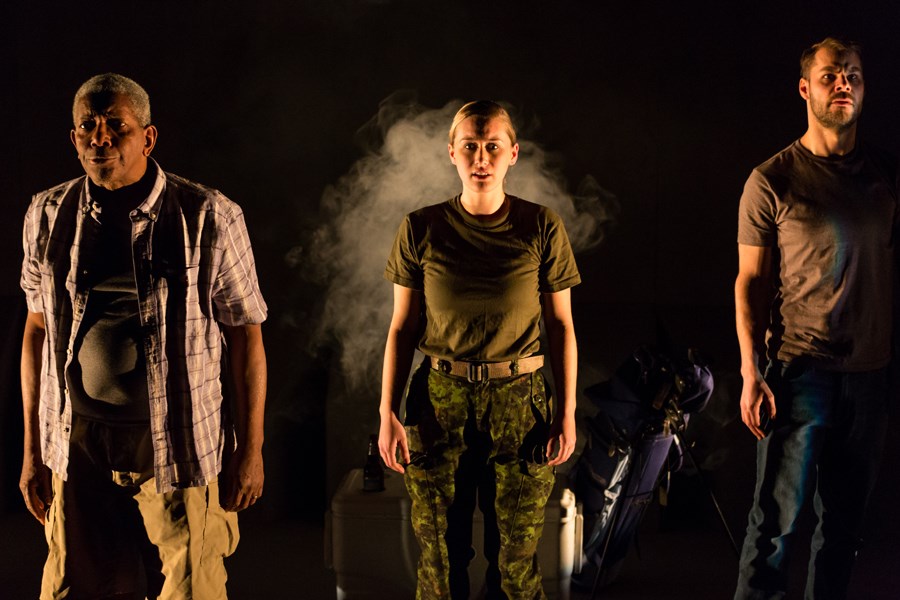There’s no good season for war. Broken bodies, broken hearts and broken minds are shipped back to their loved ones in spring, summer, fall and winter. But it’s not only soldiers who leave the battlefield with wounds physical and/or psychological; it’s also medical personnel who have to deal with the hideously wounded that are continuously being airlifted into makeshift field hospitals in places like the Kandahar Air Base in Afghanistan.
In Sean Harris Oliver’s play, The Fighting Season, Karine (Siona Gareau-Brennan), Kristy (Kyle Jespersen) and Terry (Tom Pickett) are three Canadians who have recently been sent home from Kandahar, each experiencing PTSD following a life-threatening event on the base where sand, dust, heat and blood are the elements under which they worked.
But the injured they struggled to save were sometimes Taliban warriors — young, frightened, in pain, bleeding out. Sometimes choices had to be made between the wounded, the rule being that the most likely to survive — regardless of allegiance — is attended to first.
Playwright Oliver’s father served as a doctor in Kandahar and was the inspiration for The Fighting Season so the play feels excruciatingly real and scrupulously honest. Under the direction of Evan Frayne, it’s a powerful piece of theatre made even more potent by three superb performances, very simple staging, creatively and sometimes alarmingly lit by Itai Erdal.
Tom Pickett, arguably giving one of his career’s best performances, is Terry, a surgeon who has been sent back to Canada and to his wife of many years. Of the three characters, Terry is the one who appears least troubled by what he has experienced in the Middle East. Pickett imbues the character with wry humour and a gentle manner. Terry fusses over his lawn and his golf game. “My golf game went for s*** over there,” he tells us. He talks about hockey. Pickett’s slow drawl and friendly grin provide a cover for Terry’s inner turmoil, but he eventually loses his carefully maintained composure when he uncharacteristically tears strips off a woman he does not know.
Kyle Jespersen is f-bombing Kristy whose anger is just barely below the surface; forgetting a name or a word can make him explode. Jespersen plays the character tightly wound yet desperate to be sent back to Afghanistan because being a medic in a war zone has become how Kristy defines himself. Who is he otherwise?
As Quebecoise nurse Karine, Gareau-Brennan is almost translucent; you feel you can see her beating heart. Karine copes by talking, talking, talking (sometimes in French) and going over and over the catastrophic event that plunged all three over the edge.
The Fighting Season is framed as if the characters are undergoing psychological assessment; dialogue is addressed directly to the audience. Each of them presents as “normal” at times, but each is clearly suffering and in need of counselling.
The most interesting aspect of Oliver’s play is the variation in response to the characters’ shared experience: Kristy’s anger, Terry’s avoidance and Karine’s confusion — individual reactions to the same trauma.
Awkward are a few sequences in which Jespersen speaks lyrically as opposed to his character’s usual “f” heavy dialogue. Who he is at those poetic points is unclear. And, although it later becomes obvious, confusion arises when we are led to believe all three have been killed in an explosion. The edges between fantasy and reality are briefly blurred.
At times I felt these were stories I had heard before, but The Fighting Season, presented by Bleeding Heart Theatre, is, nevertheless, riveting theatre from a new playwright who’s well worth watching.
For more reviews, go to .
The Fighting Season is at the Cultch until Jan. 21. For tickets and info, call 604-251-1363 or go to .



